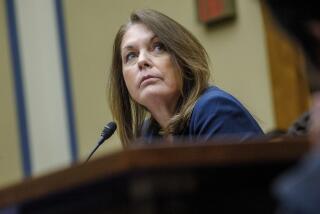Starr Urges Judge to Order Secret Service Testimony
WASHINGTON â Independent counsel Kenneth W. Starr urged a federal judge Thursday to force Secret Service officials to answer questions that he said are âhighly relevantâ to determining whether President Clinton or others in the Monica S. Lewinsky investigation have testified falsely, intimidated witnesses or obstructed justice.
Starr said that âthere is no [legal] authority, none whatsoever, zero,â for Secret Service officials to withhold from a federal grand jury information they have about matters now under investigation.
In a spirited confrontation observed by a courtroom packed to capacity, a lawyer representing the Clinton administration countered that, if the Secret Service officials are forced to testify fully, presidents will be inclined to elude their protectors, risking the national trauma of an assassination.
âThis country still has not recovered from the assassinations of Presidents Lincoln and Kennedy,â said Deputy Assistant Atty. Gen. Gary G. Grindler.
The clash between Starr and Grindler was a precursor to what lawyers expect will be a pivotal ruling by Chief U.S. District Judge Norma Holloway Johnson, who is overseeing the grand juryâs role in the Lewinsky investigation.
If Starrâs prosecutors are allowed to question Secret Service officials without restriction, they may obtain the most reliable accounts available about any meetings between Clinton and Lewinsky, the former White House intern.
The officialsâ testimony would be valuable to Starr in evaluating the truthfulness of earlier, sworn statements from both Clinton and Lewinsky, who have denied under oath that they had intimate relations.
Indeed, the testimony of Secret Service officials--including present or former uniformed or plainclothes agents--could carry more weight than the recollections of Lewinskyâs past acquaintances or presidential aides who owe their jobs to Clinton.
With the acquiescence of the White House, administration lawyers are asserting a novel âprotectiveâ privilege to shield Secret Service personnel from answering certain questions before the grand jury.
Federal law allows district or appellate judges to manufacture new privileges. In a 1996 decision noted by Grindler on Thursday, the U.S. Supreme Court created a privilege constraining what questions psychiatrists can be compelled to answer about their patients.
Starr said that a protective privilege has no ârooting in lawâ and would serve to thwart his investigation. âPrivileges stand in the way of truth seeking, which of course is necessary for justice,â he said.
Johnson ended the 65-minute hearing without suggesting how she intends to rule.
âThe matter is under advisement--and I hope that youâll hear from me soon,â Johnson said.
The judge had said at the outset that âin the near futureâ she will release edited versions of briefs filed before Thursdayâs hearing. References to confidential investigative information would be deleted.
Johnson, an appointee of President Carter who is regarded as generally pro-prosecution, listened and at one point took notes during Starrâs animated opening statement.
The judge wasted little time, however, in interrupting Grindler. Johnson asked him to explain how the Secret Serviceâs ability to protect the president would be compromised if officials were forced to answer questions behind the closed doors of a grand jury room.
Grindler answered that, if presidents see their protectors as prospective witnesses, the chief executivesâ âtrust and confidenceâ in the Secret Service would be undermined.
âA momentâs hesitation [or] resistance to that effort can mean the difference between life and death,â Grindler said.
For his part, Starr said that the information prosecutors hope to obtain from the Secret Service officials âgoes to the very core of our jurisdictionâ in investigating Clintonâs relationship with Lewinsky. On Jan. 16, at the request of Atty. Gen. Janet Reno, an expansion of Starrâs jurisdiction was authorized by a special panel of the District of Columbia Court of Appeals.
The courtâs order authorized Starr to investigate whether Lewinsky or others had âsuborned perjury, obstructed justice, intimidated witnesses, or otherwise violated federal law . . . in dealing with witnesses, potential witnessesâ and others in the sexual harassment lawsuit brought against Clinton by Paula Corbin Jones, a former Arkansas government worker. The Jones suit has been dismissed, but that ruling is being appealed.
The order also gave Starr the latitude to investigate whether Clinton had testified truthfully or sought to influence the testimony of anyone else in the Jones matter.
The hearing on Thursday offered the public a rare window into Starrâs investigation.
Under law, federal grand juries meet in private. But Johnson has taken the additional step of refusing to provide notice of hearings in her court and has blocked access to some of them. Disputes between Starrâs office and lawyers representing the White House have been considered at these hearings.
Johnson has issued, under seal, two rulings that have buoyed Starr. She ruled in April that Lewinsky does not have a binding agreement with prosecutors that would grant her immunity in exchange for her testimony. On May 4, Johnson ruled that two senior aides to Clinton may not use executive privilege to avoid answering certain questions before the grand jury.
More to Read
Sign up for Essential California
The most important California stories and recommendations in your inbox every morning.
You may occasionally receive promotional content from the Los Angeles Times.











